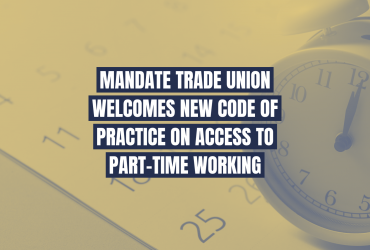Mandate calls for end to minimum wage rates which exploit young workers
Thursday 14 January 2016Mandate Trade Union has called for the abolition of exploitative and ageist sub-minima wage rates, where employers are legally allowed to pay below the minimum wage if the worker is under 18, is in their first or second year of employment over the age of 18, or who are undergoing a training course.
In their submission to the Low Pay Commission regarding sub-minima rates, the Union claims the age related rate is blatant discrimination against young people.
John Douglas, Mandate General Secretary argued, “While age discrimination is one of the nine grounds covered by Irish equality law, remarkably it does not include young people under the age of 18. If an upper age limit on the minimum wage were to be imposed in a similar fashion, it would unquestionably be challenged.”
He said, “The preservation of this rate essentially ‘constitutes unjust discrimination’. This description is not ours it’s the opinion of the Government’s special rapporteur on child protection Mr Geoffery Shannon who in his latest report has recommended from a welfare perspective that the minimum wage should be paid to all workers aged under the age of 18.”
In their submission, Mandate said “One of the justifications for the age related rate back in 2001 (when the minimum wage was introduced) was that it reflected similar rates contained in many collective agreements, particularly those in the retail sector. Since then those rates have been totally removed through negotiations between employers and Mandate Trade Union.”
The Union also explained how some employers are exploiting the legislation and workers’ rights.
“Mandate has real experience of employers exploiting the age related rate for young workers,” said Mr Douglas. “In some instances employers have used ‘if and when’ contracts and Fixed Term Specific Purpose contracts to maintain a sub-minimum wage workforce. They hire young workers for a 12 month period and then do not renew their contracts, replacing them with more young workers on sub-minimum rates – gaining a competitive advantage over employers who do not abuse the original intentions of the Act.”
In relation to the ‘First Employment Rate’, Mandate said this constitutes unfair practice and is effective discrimination.
John Douglas said, “There are many adults who through no fault of their own have failed to attain a job, particularly during the recent years of economic recession. Even though the economy is recovering, many who have been unemployed cannot even hope to be paid the full minimum wage when they enter the workforce. Instead they must face the reality that the social and economic exclusion they have endured in some cases for years must continue for a further two years before they are entitled to the minimum wage of €9.15 an hour.”
He added, “It is totally unfair to under-reward the work of those who have taken the initiative to enter the workforce. These workers make a valuable contribution in their employment and the value of their labour should be no less when you consider there is do disparity between the price of the commodity they are selling and the financial return to their employer.”
Addressing the training rate Mandate said the reality is minimum wage workers do not require and are not supplied with the level of training envisaged in the founding Act.
Mr Douglas said, “In the retail sector, sufficient training to do many of the core tasks is delivered in a matter of hours and not days or weeks.
“This has largely come about through the deskilling of many roles through the introduction of technology. In fact, in some cases the need for workers has been removed entirely through the introduction of self-scanning registers, for example,” he said.
“To devalue the work of an employee based on the pretence that they are going through a non-existent structured training programme is fundamentally unfair and the burden of proof that such a programme exists rests solely and heavily with the employer.”
Mr Douglas concluded, “Once a worker reaches a point where they can do meaningful and productive work which is equal in value to their fellow workers in the enterprise, they should at the very least be paid the same full minimum hourly rate applicable to the role.”
To read the full Mandate submission, please click here.






